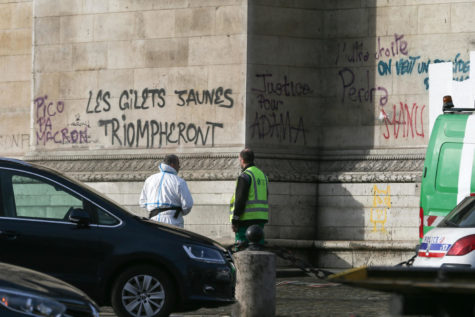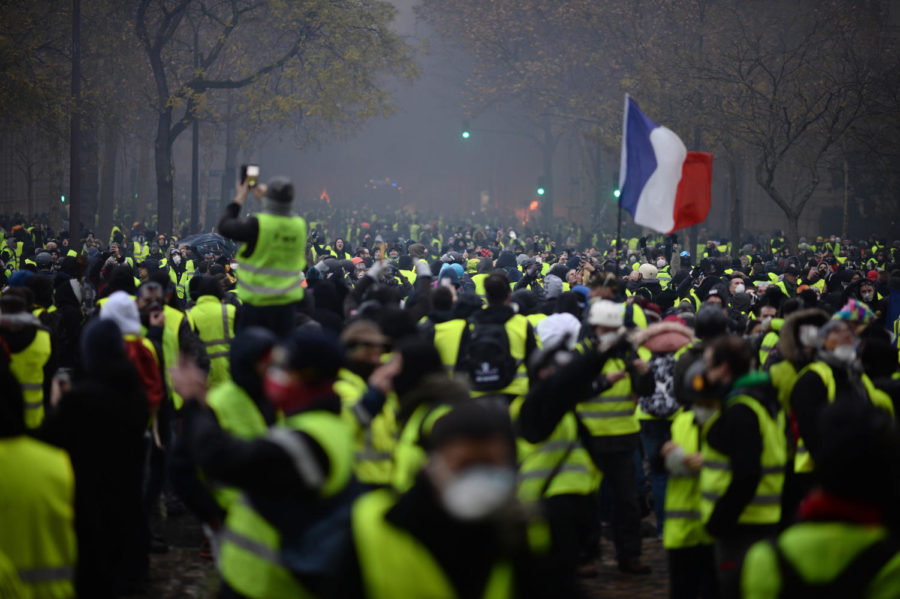The Cost of Environmentalism
Ending the worst French riots in a decade comes at the cost of backtracking on environmentally conscious decisions.
PHOTO | TNS
Yellow vests (Gilets jaunes) protest against rising oil prices and living costs on the Champs Elysees in Paris, France, on Dec. 1, 2018. Thousands of anti-government protesters are expected today on the Champs-Elysees in Paris, a week after a violent demonstration on the famed avenue was marked by burning barricades and rampant vandalism that President Emmanuel Macron compared to “war scenes.” (Eliot Blondet/Abaca Press/TNS)
For three weeks, a grassroots organization called “Les Gilets Jaunes” (Yellow Jackets, named after the yellow safety vests french drivers must carry) have created chaos on the streets of France. Their movement began in protest of a new French policy that would heavily tax gas, but as time has progressed, their goals have expanded to include various other social injustices such as the poverty rate and the low minimum wage. In a first for President Emmanuel Macron’s 18 months in office, the French government has bowed to the will of the protesters and put the new tax on hold, and began talks with prominent figures of the Gilets Jaunes movement in attempt to calm the riots. The gas tax itself stemmed from Macron’s desire to shift France to a more environmental country, as well as create more investment in public transportation, electric vehicles and other environmentally conscious forms of transportation. However, the government should have considered the viewpoints of those who would have been negatively affected by the tax.
The gas tax is the epitome of a bad decision born from good intentions. In theory, raising the prices of gas to discourage the use of fossil fuels and therefore helping the environment is a great idea. The problem is that there are people in France who are already struggling financially, who live in rural areas far away from any public transportation and who cannot afford electric cars. By making gas less affordable, the government is showing that it doesn’t think about those who need to use fossil fuels to get to move around in their lives.
The Gilets Jaunes protesting en masse was a good move to show the government how unpopular the decision to change the price of gas was, as well as a good way to show the general discontent in France at several other factors like minimum wage and living costs. The violent protests, however, that have resulted in burning barricades and major vandalism, is not an effective way to make a change. Protesters have burned buildings and spray painted the L’arc de Triomphe. In Marseilles, a bystander died after being hit with a tear gas canister by protesters, according to the New Yorker. The violence does nothing more than make the Gilets Jaunes out to be violent anarchists, when they are actually protesting for a reasonable cause.

The pillars of the Arc de Triomphe monument tagged in Paris on Sunday, Dec. 2, 2018, a day after clashes during a protest of Yellow vests (Gilets jaunes) against rising oil prices and living costs. Anti-government protesters torched dozens of cars and set fire to storefronts during daylong clashes with riot police across central Paris, as thousands took part in fresh ”yellow vest” protests against high fuel taxes. (Michel Stoupak/NurPhoto/Zuma Press/TNS)
Macron, who was elected on the premise that he would improve life for the poor, has come under criticism due to the fact that many don’t feel as if he’s held up to his promise. The rising gas prices was the final straw that lead to the massive protests against him. Pausing the gas tax is the first step towards making amends and ending the riots. The French Prime Minister, Édouard Phillippe, has also begun negotiations about potentially raising salaries in France. The government needs to listen to it’s poorer citizens, those who will be unfairly affected by new policies and allow them to have a voice in things that will change their lives. If the government wants to wean France off of fossil fuels, it needs to be sure that public transportation is readily available everyone. If not, it will need to find a different way to reduce dependency on fossil fuels, or not do it at all.



